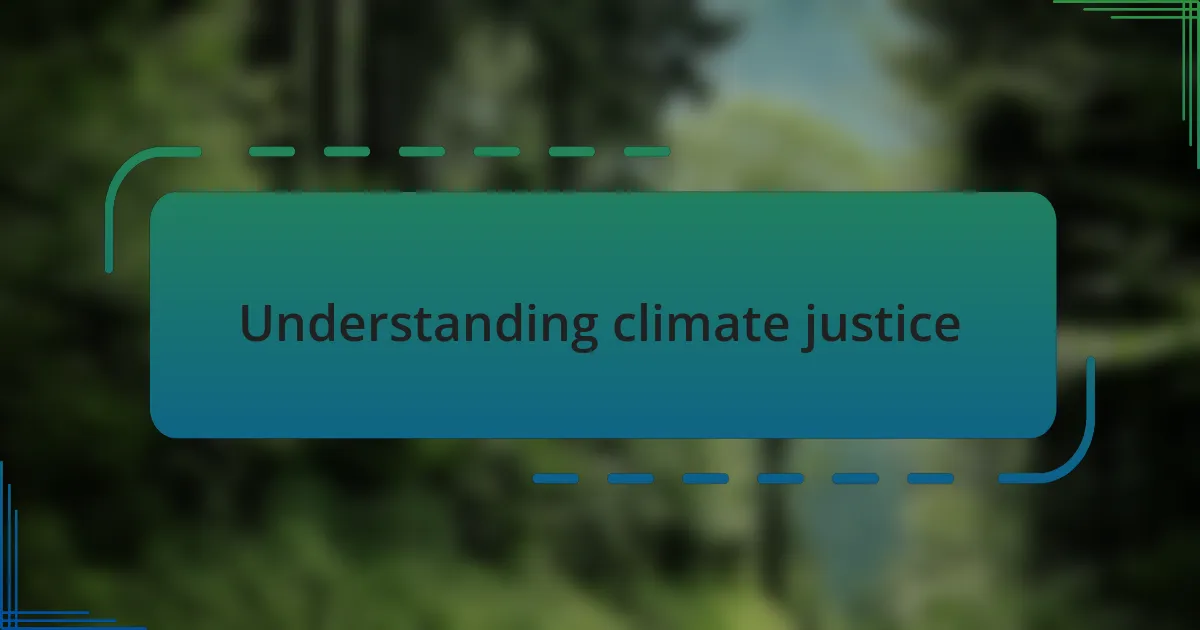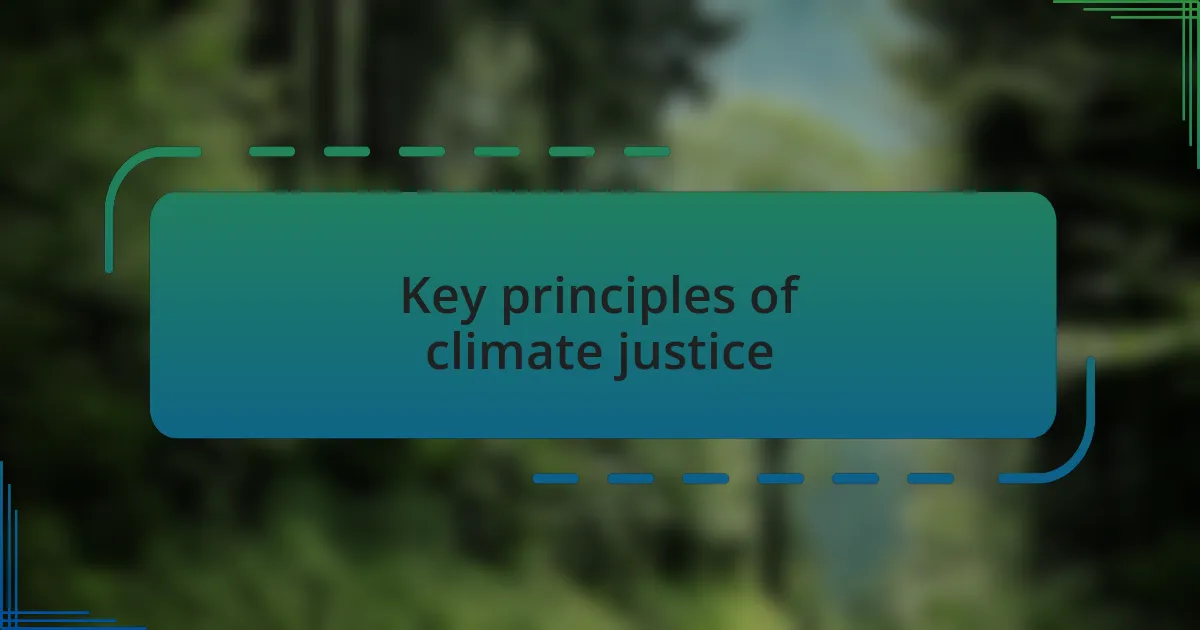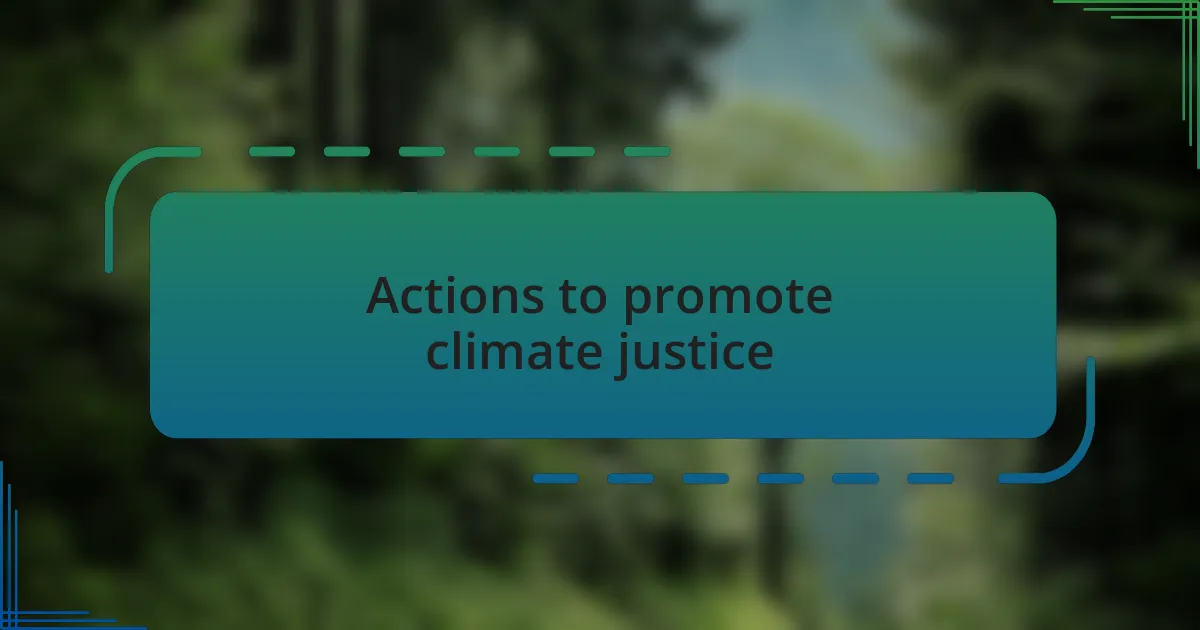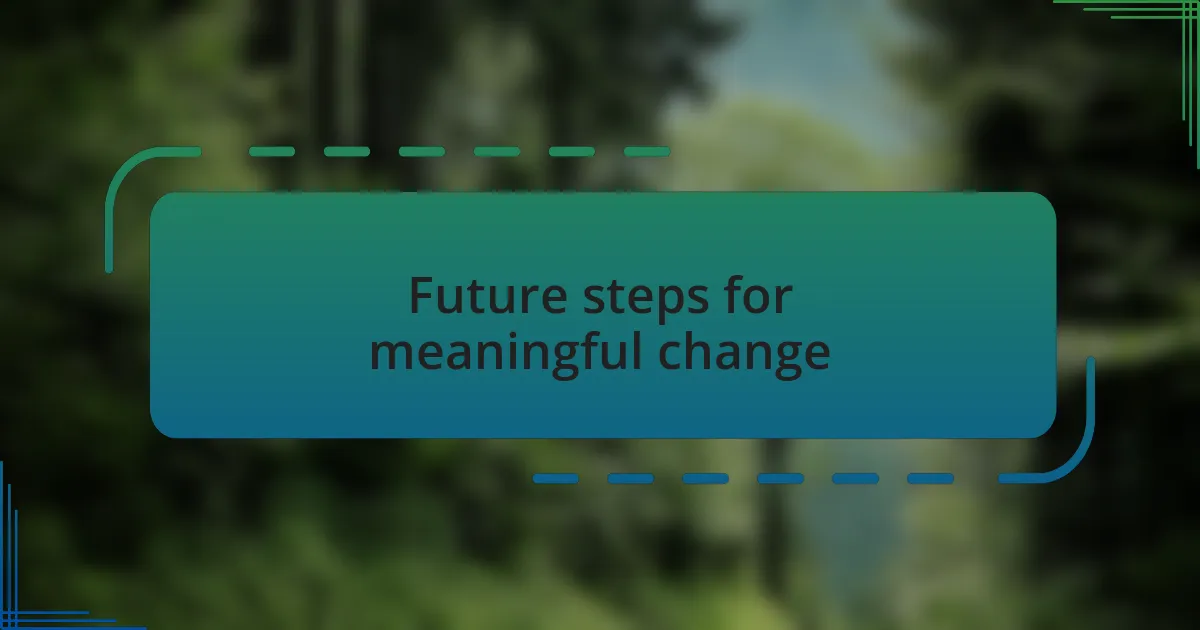Key takeaways:
- Climate justice highlights the unfair impact of climate change on marginalized communities, urging the inclusion of their voices in policy decisions.
- Effective climate action can create economic opportunities and promote sustainability, benefiting both the environment and local economies.
- Core principles of climate justice include intergenerational equity and the importance of engaging diverse voices for impactful solutions.
- Future efforts should focus on collaboration between governments and grassroots organizations, alongside integrating climate justice education to empower future generations.

Understanding climate justice
Climate justice is fundamentally about recognizing that those who contribute the least to climate change often suffer its most severe effects. When I think about communities that face devastating hurricanes or droughts, I can’t help but feel a deep sense of empathy. How is it fair that the people who have historically emitted the least carbon—like rural farmers in developing nations—are being hit the hardest?
It also strikes me that climate justice invites us to consider the intersection of social responsibility and environmental stewardship. For instance, I recall visiting a coastal town that was dealing with rising sea levels. The faces of the residents, full of concern for their homes and livelihoods, reminded me that these are not just statistics; they are real people with real stories, facing real challenges.
Moreover, climate justice calls for inclusive solutions that elevate the voices of those who are often marginalized. Why should a decision about climate policy be made without the input of those directly impacted? Engaging these communities in the conversation ensures that our actions are not only just but also effective in addressing the inequities that persist in our society.

Importance of climate action
Taking action on climate change is essential for our planet’s health and our future. Every time I walk through a forest or stand on a mountain, I feel a profound connection to these natural spaces. They are not just beautiful; they’re critical ecosystems that support countless forms of life. When I see their decline, it’s a reminder of what’s at stake. If we don’t address climate change now, is it the future we want to leave for our children?
Moreover, the economic implications of climate action can’t be ignored. I remember attending a community meeting where local leaders discussed how investing in renewable energy creates jobs and stimulates local economies. It made me realize that climate action is an opportunity, not just a necessity. By shifting our focus to sustainability, we can foster innovation and build resilient communities. Isn’t it inspiring to think that our efforts today can pave the way for a prosperous tomorrow?
Finally, there’s a personal responsibility embedded in climate action that resonates deeply with me. It’s not just about policy changes; it’s also about individual choices. I often reflect on the small actions I can take, like reducing waste or supporting eco-friendly businesses. Each choice adds up, creating a collective impact. When I think of the positive changes I can contribute to, I feel empowered. How can we not act when the stakes are so high and the potential benefits are so significant?

Key principles of climate justice
There are several key principles of climate justice that guide the movement towards equitable solutions. One core tenet is the recognition of the disproportionate impact of climate change on marginalized communities. I vividly recall visiting a low-income neighborhood that faced frequent flooding. The juxtaposition was stark: affluent areas received resources for resilience, while these communities struggled. It begs the question, how can we claim to be fighting for the planet if we ignore those most affected?
Another principle is intergenerational equity, which emphasizes the responsibility we have to future generations. Sometimes, I think about the world my children will inherit—will it be one ravaged by climate disasters or one where sustainability thrives? This principle pushes us to consider the outcomes of our actions today, reminding us that every choice has ramifications far beyond our immediate context. How can we face the next generation if we leave them with a legacy of inaction?
Inclusion is also vital to climate justice. Engaging diverse voices, especially those from frontline communities, enriches the conversation and leads to more effective solutions. I remember a workshop where community members shared their experiences and innovative ideas for local sustainability. Those discussions highlighted the unique perspectives that lay the foundation for impactful change. It’s crucial to ask ourselves: are we truly listening to those affected, or are we merely speaking for them?

Actions to promote climate justice
Investing in renewable energy projects within marginalized communities is a significant action we can take to promote climate justice. I recall a visit to a small town that had embraced solar energy initiatives. The transformation was incredible; not only did it reduce their dependence on fossil fuels, but it also created job opportunities. Isn’t it empowering to witness a community harnessing their resources to build a sustainable future?
Another impactful action is advocating for policy changes that prioritize the needs of vulnerable populations. I remember attending a local council meeting where residents voiced their concerns about rising utility costs and air quality issues. Their passionate testimonies moved the decision-makers to consider policies that would provide subsidies for energy-efficient upgrades in low-income households. Isn’t it amazing what can happen when people unite to demand equitable treatment?
Education and awareness campaigns tailored for frontline communities play a crucial role in promoting climate justice. I’ve seen firsthand how workshops on environmental literacy can transform perspectives. In one such session, participants shared their visions for environmental stewardship; their insights brought an incredible depth to the discussion. When we empower communities through knowledge, aren’t we laying the groundwork for a more just and sustainable world?

Future steps for meaningful change
As we look ahead, prioritizing collaborations between governments and grassroots organizations can drive meaningful change. I recall a workshop where local activists shared successes from their partnerships with city officials, which not only secured funding for community-led projects but also fostered a sense of shared responsibility. Isn’t it inspiring to see different sectors come together for a common cause, elevating the voices of those historically marginalized?
Another vital step is integrating climate justice into educational curricula at all levels. Watching young students engage in discussions about ecological impacts and social justice has been eye-opening for me. When students connect their knowledge with the issues that affect real lives, it sparks a passion for activism among them—imagine a future generation equipped to advocate for change!
Investing in sustainable infrastructure that prioritizes accessibility for all remains key to fostering equity. I remember walking through neighborhoods where public transport systems were being revamped to connect underserved areas to green spaces and economic opportunities. It felt like a tangible step towards dismantling barriers—could this be the shift that empowers communities to reclaim their agency amid climate challenges?